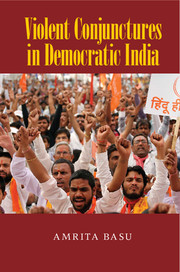Book contents
- Frontmatter
- Dedication
- Contents
- List of Figures and Tables
- Acknowledgments
- Glossary of Indian Words and Terms
- Indian Organizations, Institutions, and Political Parties
- Abbreviations of Political Parties and Organizations
- Introduction
- PART I THE PILLARS OF HINDU NATIONALISM
- PART II EXTENSIVE VIOLENCE
- 4 When Local Violence Is Not Merely Local: A Tale of Two Towns
- 5 Gujarat: The Perfect Storm
- PART III EPISODIC VIOLENCE
- Selected Bibliography
- Index
- Books in the Series (continued from page iii)
5 - Gujarat: The Perfect Storm
from PART II - EXTENSIVE VIOLENCE
Published online by Cambridge University Press: 05 July 2015
- Frontmatter
- Dedication
- Contents
- List of Figures and Tables
- Acknowledgments
- Glossary of Indian Words and Terms
- Indian Organizations, Institutions, and Political Parties
- Abbreviations of Political Parties and Organizations
- Introduction
- PART I THE PILLARS OF HINDU NATIONALISM
- PART II EXTENSIVE VIOLENCE
- 4 When Local Violence Is Not Merely Local: A Tale of Two Towns
- 5 Gujarat: The Perfect Storm
- PART III EPISODIC VIOLENCE
- Selected Bibliography
- Index
- Books in the Series (continued from page iii)
Summary
Ethnic violence – in 1969, 1981, 1985, 1990, 1992–3, and 2002 – has lasted longer and been more destructive in Gujarat than in any other state in postindependence India. Bhikhu Parekh observes that Gujarat has “the dubious double distinction of having the highest per capita deaths in the country and causing the highest number of casualties in a single cluster of riots.” Five hundred and twenty-four people were killed amid Hindu-Muslim violence in 1969. About 500 people were killed in Ayodhya-related events from September 1990 to January 1993. Official estimates are 1,180 and unofficial estimates are 2,000 deaths in February-March 2002.
Thus for some scholars, 2002 was another event in a familiar series of violence. Based on a longitudinal database of “riots” in India, Steven Wilkinson identifies the continuities between 2002 and earlier times in Gujarat and other states:
The Gujarat violence has been so truly awful that it is perhaps necessary to remind ourselves that seen in the context of the previous major riots in India, the recent events have not been exceptional. In all the largest communal riots since independence … state governments from various political parties have, as in Gujarat, delayed taking action to stop the violence for days or even weeks. In most of these riots, as in Gujarat in the past month, minorities suffered disproportionately.
Others argue that March 2002 constituted India's first pogrom and that the scale and intensity of the violence were unprecedented. No single “riot” claimed as many lives as the one in February–March 2002; at least 495 people were killed in just three days. Moreover, the brutality of the violence was unparalleled. Depicting the violence as exceptional risks ignoring its analogs and the quotidian acts of violence that “ordinary” people routinely commit. However, depicting the 2002 violence as part of a continuum may not adequately acknowledge the magnitude of the suffering and the conjuncture of events that caused it.
Clearly there were continuities between 2002 and earlier years: the rumors, biased press reports, police inaction or complicity, and responsibilities of Hindu nationalists.
- Type
- Chapter
- Information
- Violent Conjunctures in Democratic India , pp. 162 - 200Publisher: Cambridge University PressPrint publication year: 2015



